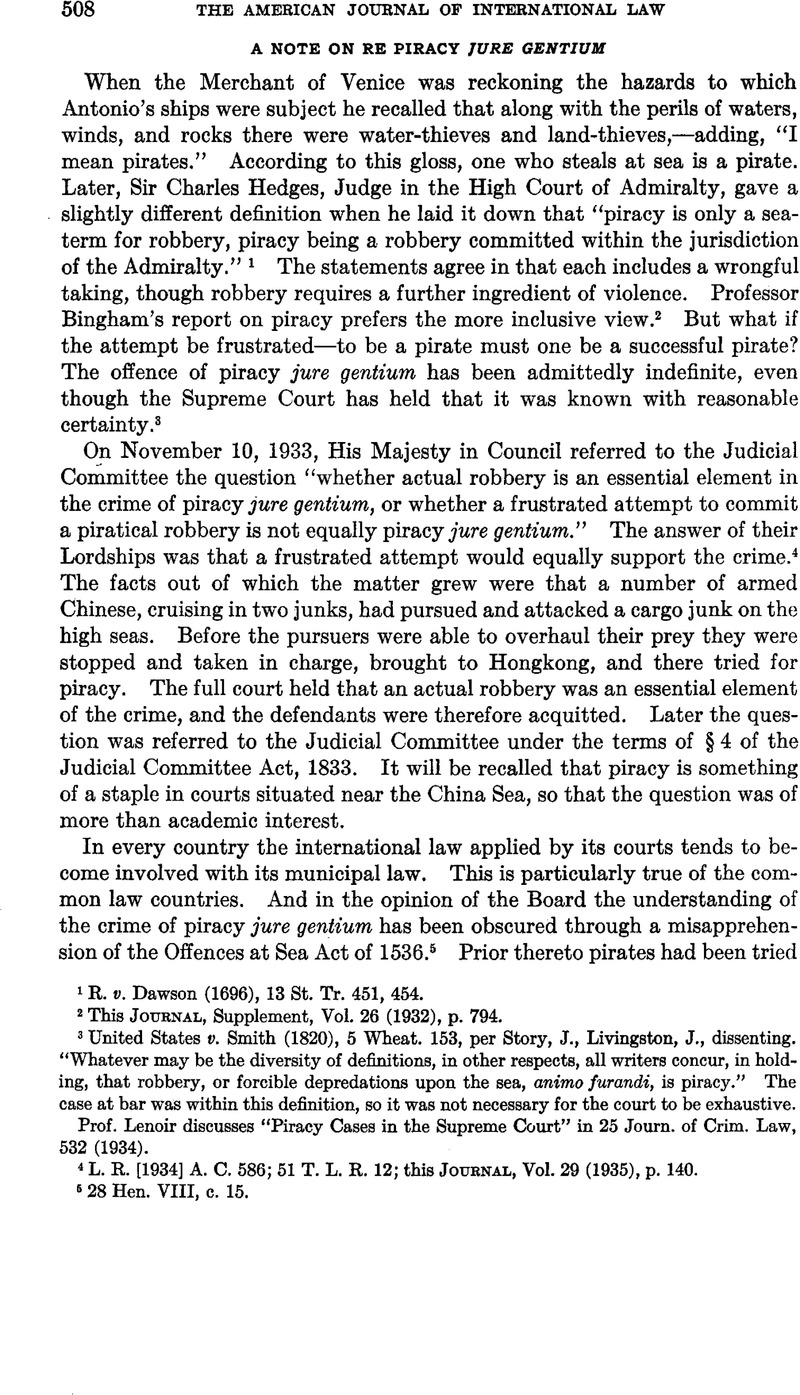Published online by Cambridge University Press: 12 April 2017

1 R. v. Dawson (1696), 13 St. Tr. 451, 454.
2 This journal, Supplement, Vol. 26 (1932), p. 794.
3 United States v. Smith (1820), 5 Wheat. 153, per Story, J., Livingston, J., dissenting. “Whatever may be the diversity of definitions, in other respects, all writers concur, in holding, that robbery, or forcible depredations upon the sea, animo furandi, is piracy.” The case at bar was within this definition, so it was not necessary for the court to be exhaustive. Prof. Lenoir discusses “Piracy Cases in the Supreme Court” in 25 Journ. of Crim. Law, 532 (1934).
4 L. R. [1934] A. C. 586; 51 T. L. R. 12; this journal, Vol. 29 (1935), p. 140.
5 28 Hen. VIII, c. 15.
6 Cf. Art. 3 of the Harvard Research Draft Convention on Piracy, this JOTJKNAL, Supplement, Vol. 26 (1932), p. 768.
7 C. 196. M. 70. 1927. V.
8 Ser. A. Nos. 20/21.
9 Feist v. Société intercommunale beige d'electricite\ [1933] 1 Ch. 684; [1934] A. C. 161; this journal, Vol. 28 (1934), p. 374.
10 “Changing Concepts and the Doctrine of Incorporation,” this journal, Vol. 26 (1932), p. 239.
11 (1876) 2 Ex. D. 63. 11a “The object of the common law is to solve difficulties and adjust relations in social and commercial life. It must meet, so far as it can, sets of facts abnormal as well as usual. It must grow with the development of the nation. It must face and deal with changing or novel circumstances. Unless it can do that it fails in its function and declines in its dignity and value. An expanding society demands an expanding common law.” McCardie, J., discussing, obiter, the doctrine of agency of necessity, in Prager v. Blatspiel, Stamp and Heacock, Ltd. [1924] 1 K. B. 566. The dictum in this case was later disapproved by Scrutton, L. J., in Jebara v. Ottoman Bank [1927] 2 K. B. 254, 270. Greater rigidity is maintained in the sphere of property. Cf. Keeton and Gower, “Freedom of Testation in English Law,” Iowa Law Review, Vol. 20, pp. 326, 327.
12 [1933] 1 K. B. 529; 49 T. L. R. 130.
13 [1932] A. C. 562.
14 (1916) 217 N. Y. 382.
15 He thought it had been put accurately by Lord Dunedin in Mortensen v. Peters (1906), 14 Scots. L. T. 227, this journal, Vol. 1 (1907), p. 526: “It is a trite observation that there is no such thing as a standard of international law, extraneous to the domestic law of a kingdom to which appeal may be made. International law, so far as this court is concerned is the body of doctrine regarding the international rights and duties of states which has been adopted and made part of the law of Scotland.” Lord Macmillan was of counsel in Mortensen v. Peters.